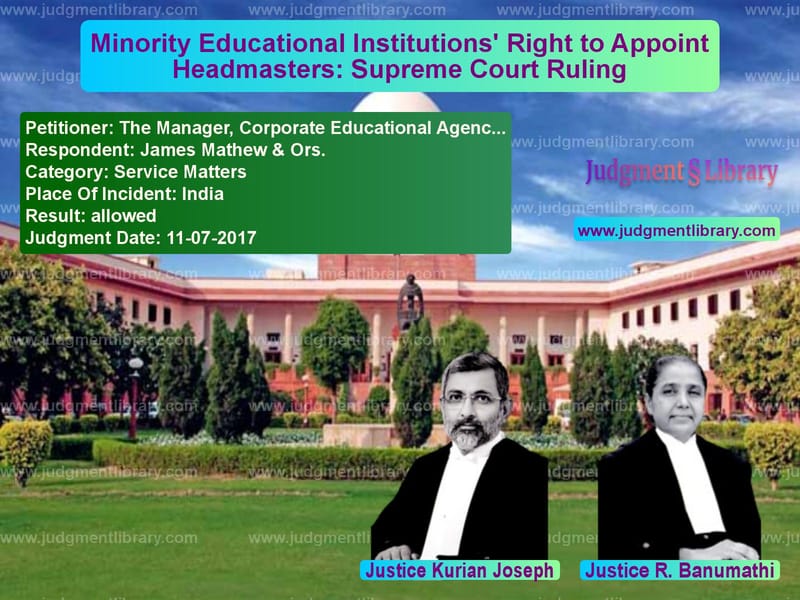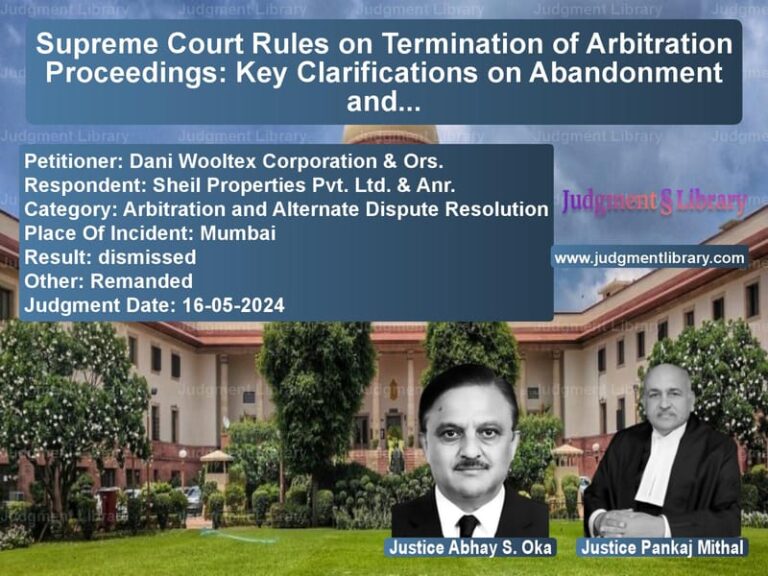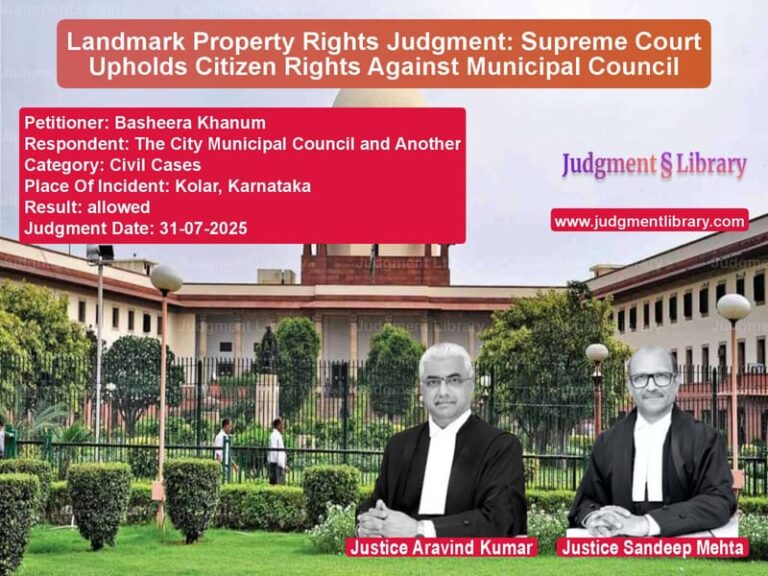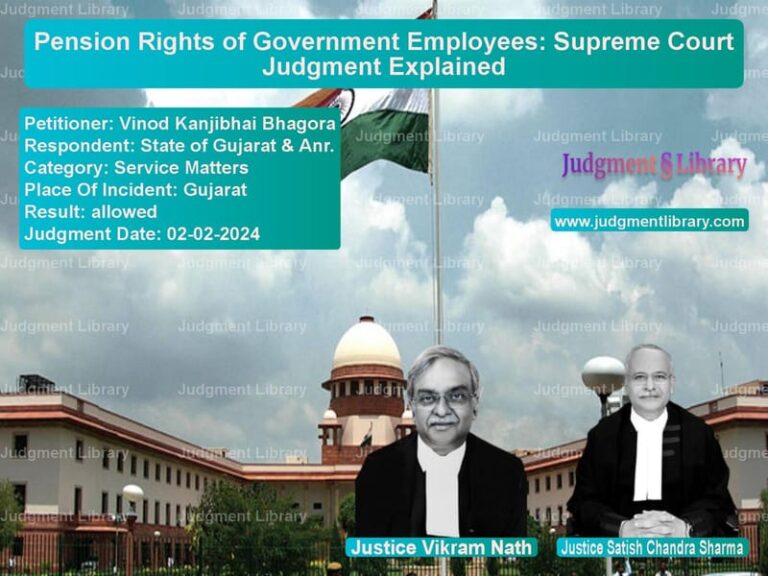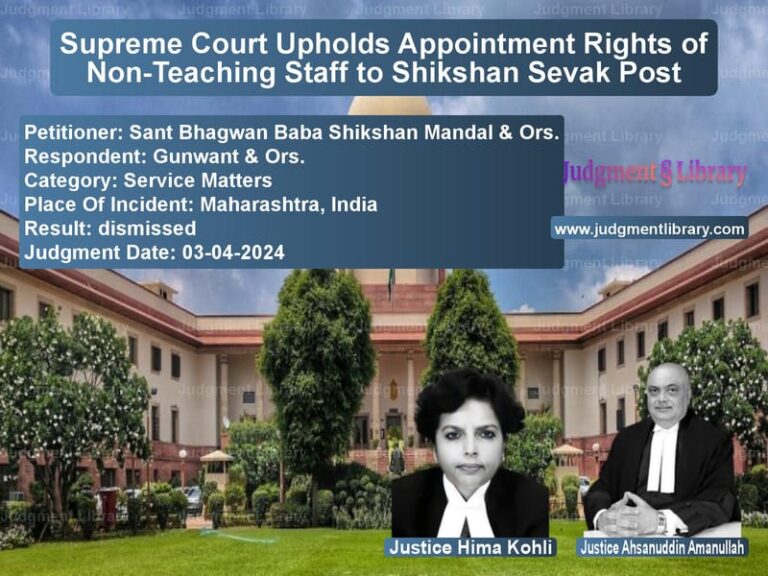Minority Educational Institutions’ Right to Appoint Headmasters: Supreme Court Ruling
The case of The Manager, Corporate Educational Agency vs. James Mathew & Ors. revolves around the rights of minority educational institutions in appointing a Headmaster of their choice. The Supreme Court was called upon to determine whether such institutions have an absolute right to appoint a person of their choice or if they are bound to consider senior qualified teachers from the same community.
The dispute arose when the appellants, who were minority educational institutions, appointed individuals of their choice to the post of Headmaster, bypassing senior eligible teachers from the same community. The High Court ruled against them, stating that they did not have absolute freedom in making such appointments. Aggrieved by this decision, the institutions appealed to the Supreme Court.
Background of the Case
The core issue in the case was whether the management of minority educational institutions, which receive state aid, had unrestricted freedom to appoint a Headmaster or Principal. The High Court had ruled that minority institutions cannot overlook qualified senior teachers from the same community while making such appointments.
The High Court also questioned the validity of the minority status certificate issued by the National Commission for Minority Educational Institutions (NCMEI), stating that such certificates could not be applied retrospectively.
Petitioners’ Arguments
The petitioners, represented by senior counsel, argued:
- The right of minority institutions to establish and administer educational institutions under Article 30(1) of the Constitution includes the right to appoint a Headmaster of their choice.
- As per the ruling in Secy. Malankara Syrian Catholic College vs. T. Jose [(2007) 1 SCC 386], minority institutions have full autonomy in selecting their Headmaster or Principal, even if they receive state aid.
- Declaring minority status is merely a recognition of an existing fact, and such recognition does not operate prospectively.
Respondents’ Arguments
The respondents, who were aggrieved teachers, argued:
- Although minority institutions have certain rights under Article 30(1), these rights do not override principles of fairness and seniority.
- The High Court was correct in ruling that minority institutions must consider senior eligible teachers while making appointments.
- The minority status certificate issued by NCMEI could not have retrospective effect and should only apply to newly established institutions.
Supreme Court’s Observations and Judgment
The Supreme Court, in a judgment delivered by Justice Kurian Joseph, overturned the High Court’s ruling and reaffirmed the rights of minority institutions. The Court held:
- Minority educational institutions have the absolute right to appoint a Headmaster of their choice. The right under Article 30(1) includes the right to administer educational institutions freely.
- The management is not obligated to appoint the most senior teacher, even if they belong to the same community. They have the discretion to assess factors such as philosophy, ability, and commitment to the institution’s values.
- As per the ruling in N. Ammad vs. Manager, Emjay High School [(1998) 6 SCC 674], a minority status certificate is merely declaratory and does not create a new right. It recognizes an existing status and is applicable retrospectively.
The Supreme Court concluded that once a minority institution makes a conscious choice to appoint a qualified person from its community, courts cannot interfere in the decision.
Key Legal Principles Established
The judgment reaffirmed several important legal principles:
- Absolute Right Under Article 30(1): Minority institutions have full discretion in selecting their Headmaster or Principal, even if they receive state aid.
- No Obligation to Follow Seniority: Institutions can appoint any qualified person of their choice and are not bound to follow seniority-based promotions.
- Minority Status Certificate: Such certificates are declaratory and confirm an existing status rather than creating a new one.
- Limited Judicial Interference: Courts should not interfere in the internal administration of minority institutions, especially in matters of appointment.
Impact of the Judgment
This landmark ruling has significant implications for minority educational institutions across India:
- It provides greater autonomy to minority-run institutions in managing their affairs, particularly in appointing leadership positions.
- It ensures that institutions are not forced to appoint candidates based solely on seniority, thereby maintaining their distinct educational and cultural identity.
- The ruling sets a precedent limiting the scope of judicial intervention in minority institution management decisions.
Conclusion
The Supreme Court’s decision in The Manager, Corporate Educational Agency vs. James Mathew & Ors. upholds the fundamental rights of minority institutions under Article 30(1) of the Constitution. By reaffirming their authority to appoint a Headmaster of their choice, the Court has reinforced the autonomy granted to such institutions.
This ruling ensures that minority institutions can function in accordance with their ethos without undue interference. It also clarifies the legal standing of minority status certificates, confirming that they merely recognize an existing right rather than creating a new one.
In light of this judgment, minority educational institutions can confidently exercise their right to administer their institutions without being bound by seniority-based appointment rules.
Don’t miss out on the full details! Download the complete judgment in PDF format below and gain valuable insights instantly!
Download Judgment: The Manager, Corpora vs James Mathew & Ors. Supreme Court of India Judgment Dated 11-07-2017.pdf
Direct Downlaod Judgment: Direct downlaod this Judgment
See all petitions in Employment Disputes
See all petitions in Public Sector Employees
See all petitions in Recruitment Policies
See all petitions in Judgment by Kurian Joseph
See all petitions in Judgment by R. Banumathi
See all petitions in allowed
See all petitions in supreme court of India judgments July 2017
See all petitions in 2017 judgments
See all posts in Service Matters Category
See all allowed petitions in Service Matters Category
See all Dismissed petitions in Service Matters Category
See all partially allowed petitions in Service Matters Category

